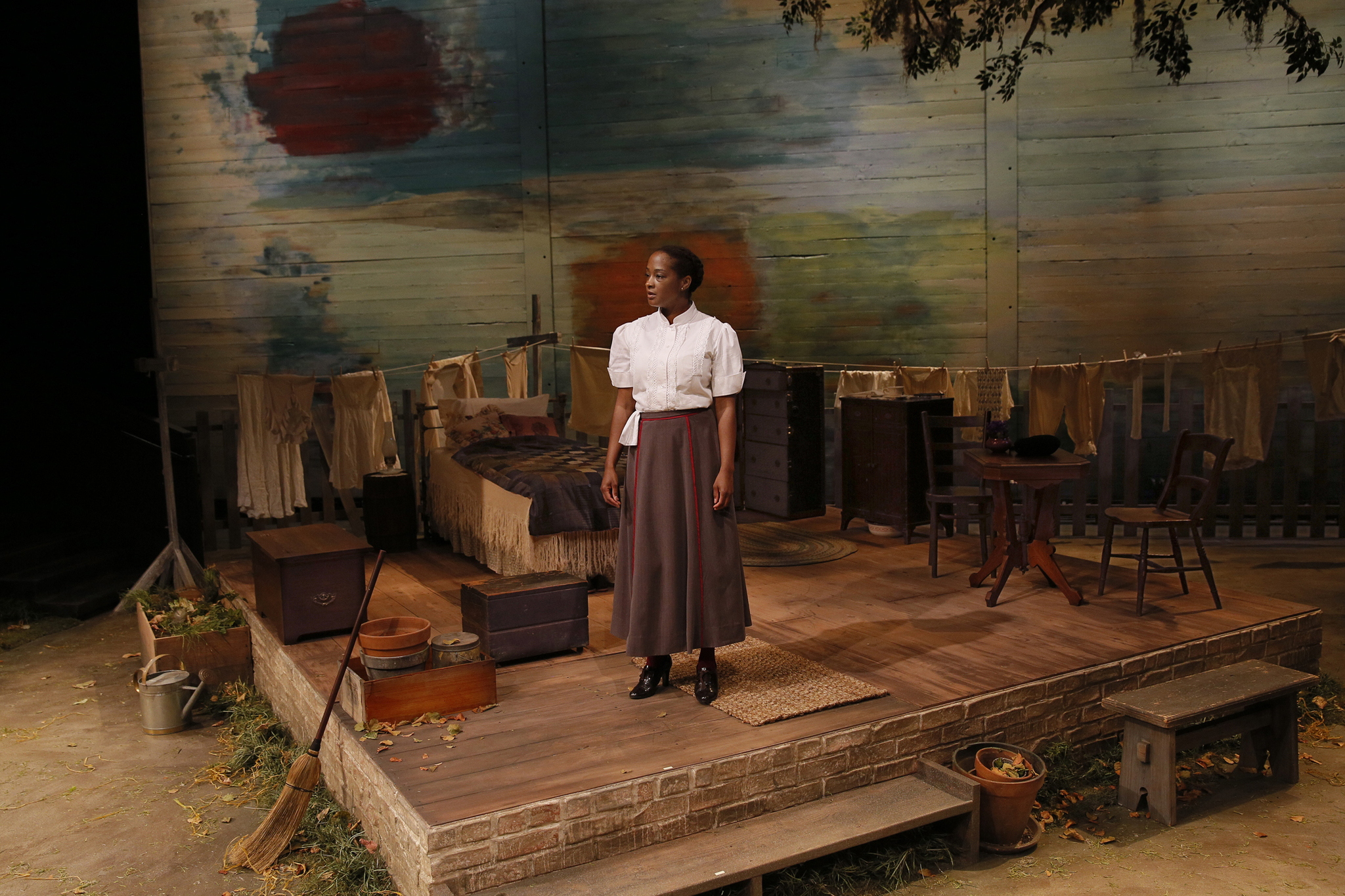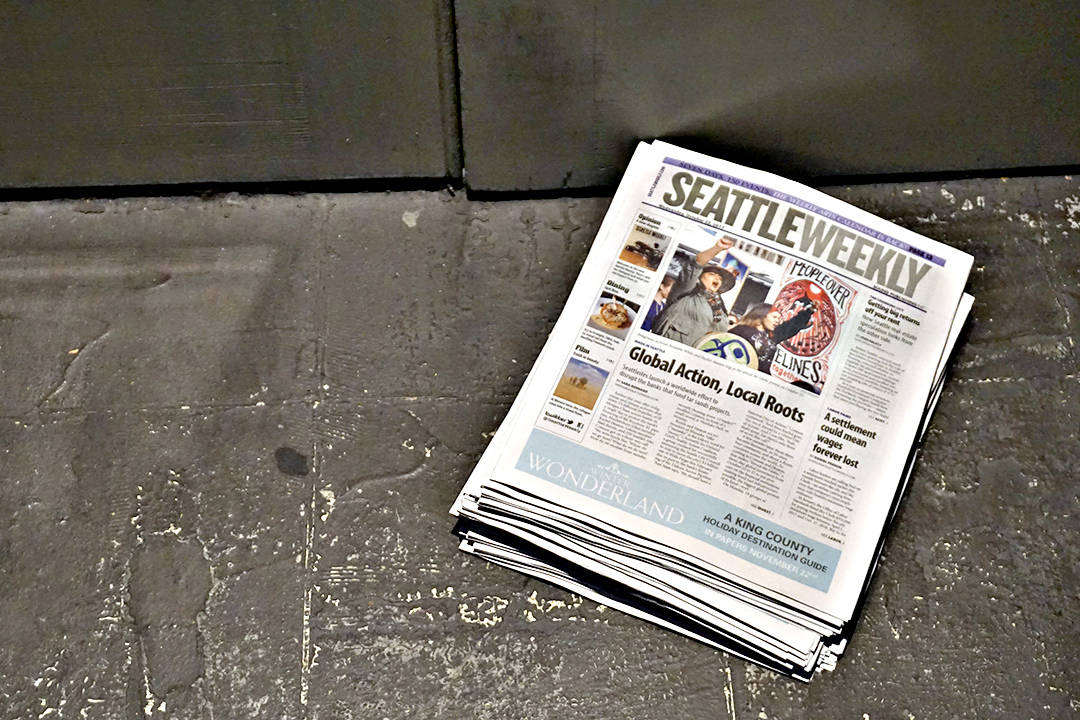It isn’t until Act 2 of the current production of Eugene Ionesco’s Rhinoceros at 12th Avenue Arts that Strawberry Workshop Theater plays its Trump card.
In the midst of one character’s unsettling (and quite convincing) transformation into a rhinoceros, the hero of this absurdist tale, Berenger, picks up a copy of Time and flips through its pages. There on the cover, flashed for a brief, loaded moment, is the current Republican nominee for president.
The resulting laughter on one of the first nights of this dizzying and darkly comic production was preordained, a recognition of the play’s singular nod to something that everyone in the room likely already knew—if not from the play’s promotional materials, which look like collateral for a national convention, then from the uncanny similarity that Ionesco’s play has to all our Facebook newsfeeds (a more contemporary kind of absurdist text). This story is an allegory, the magazine cover was reiterating, and it’s about us, right now.
Twenty-first-century Americans were not the original audience for Rhinoceros, of course. When in 1959 Ionesco wrote his story about the rise of an unlikely kind of fanaticism in a provincial French village, the French-Romanian playwright was speaking to a public as close to Nazism as Americans are to September 11 today. He was also recalling his young adulthood, when he watched friends bow to Romania’s less-successful but similarly fascistic Iron Guard.
“I have been present at mutations,” Ionesco wrote in his journal in 1940 (and later recalled in his memoir Present Past Past Present). “I have seen people transformed almost beneath my eyes… . They lost their personality and it was replaced with another.”
The transformations aren’t so obvious early on in Rhinoceros, but the seeds of calamity are planted. In the first scene of this Jess K. Smith-directed production, we are introduced to two friends, the slovenly and hung-over Berenger (Carol Louise Thompson) and the tidy and demanding Jean (Sean Belyea). Berenger is a nervous wreck, prone to drink to blot out social anxiety. Disgusted by his friend’s habits, Jean encourages Berenger to shape up. In the meantime, the first two (or is it one?) rhinoceroses careen through the town, eliciting cries of astonishment from the townspeople and trampling a cat before the scene returns to normal.
As the dust settles, the town logician (a minor but memorable turn by Brandon Felker) gives a wildly misinformed tutorial on syllogism as Jean continues to encourage Berenger, telling her to apply herself to her work and go after the girl of her dreams, Daisy (Amy Mayes). It is an indoctrination for a character originally written as a man; but delivered to a female Berenger, Jean’s advice complicates the plot. Whereas Ionesco’s original text positions Jean as a kind of bully, pressuring his friend to conform to a more traditional idea of masculinity, this production presents Jean—for a moment at least—as an ally, encouraging his friend’s feminist tendencies in a diatribe that is otherwise grossly conservative and xenophobic. It’s an odd effect, but one that aligns well with today’s less-partisan sexual politics. Still, the effect is disorienting, contributing to an unappealing messiness in that first scene.
As the fanaticism spreads in the second half, the plot picks up as the horror of the mass metamorphoses is made manifest with some forceful stagecraft. As more and more of the townsfolk turn into actual pachyderms, their imposing, horny shadows are projected onto the set’s modest backdrop, feeding the anxiety of Berenger, played with frantic unease by Thompson. Just as the fanatical fervor hits a pitch, video of Nazi rallies is projected onto the set, goose-steps set to a soundtrack of marauding beasts.
It is a disquieting moment, as is any moment in which Adolf Hitler and company are shown in their full, brutal choreography. This blatant invocation of Nazism—along with the play’s appeal to Trumpism—is also one of the production’s failures, a dramatic kind of Godwin’s Law that in its damning dot-connecting and strict prescription diminishes the original text, rubbing uncomfortably against Ionesco’s individualistic sympathies. Telling an audience how to experience a play that is at its core about resisting conformity is some high irony.
After all, it is not the nature of the fanaticism that is at the heart of this work, but the conviction of its protagonist. “Those who hang onto their individuality always come to a bad end,” she says before proclaiming, in defiance of this truth: “I am not capitulating!”
Isolation is at the core of Wedding Band as well, but the play, the final production of Intiman Theater’s 2016 festival, is no allegory. Written by Alice Childress in 1966, the story of an interracial marriage in the deep South during World War I is rich in its realism and, while performed by this able cast with a heightened sense of drama, never for a moment unbelievable.
The play, directed by Valerie Curtis-Newton, opens with Julia Augustine (Dedra Woods in a forceful performance) settling into her new home, a modest one-room apartment in the backyard of an estate run by Fanny Johnson, a well-to-do proprietor and the only black woman allowed to own property in the area. In these early moments, Childress’ powers are on full display with language that vividly paints the story’s racial boundaries without succumbing to didacticism. “Some people are ice cream,” says Fanny, with a smile, “and others are cow dung.”
The set in Jones Playhouse, deftly constructed by designer Jennifer Zeyl, is a visual parallel to Childress’ language—vivid, well-appointed, and intentional in its invocation of labor, a looming faith, and solitude for its protagonist. Outside of Julia’s spare quarters, the set is also crowded with the energetic lives of Fanny’s other tenants, which include the bold Mattie (Aishe Keita) and diligent Lula Green (Shaunyce Omar), as well as their families.
Julia is a mystery to her new neighbors, who can’t help but nose in on her privacy. But curiosity turns to suspicion with the arrival of Herman, a baker who 10 years prior married Julia after she appeared one day in his shop. Trouble follows.
Much is familiar about Childress’ script: the intransigent racism of the Jim Crow South and the many different ways black Americans responded to their oppressors—obedience, escape, defiance. What makes Childress’ work so remarkable is that this is a story about women, fitting for an Intiman festival devoted to the voices of black women. The men here—who include a sinister racist salesman (Martyn G. Krouse) and soldier son Nelson Green (Jason Stanford)—are largely secondary to the women, who embody the labor and the struggle at the heart of the play.
When Herman falls victim to the flu epidemic and his family is called to care for him, it is his mother (a frighteningly stentorian Anne Allgood) who arrives on the scene. Incapacitated by his illness, Herman lies silent as his mother and his wife go to battle. The row is an unforgettable piece of theater, marked by sharp invective and brutal name-calling on both sides. The rupture is undeniable, the very air in the room changed as the story’s racist underpinnings, once hidden by propriety, are exposed.
Love may transcend the lines drawn by racism, we are reminded, but it cannot erase them. Rhinoceros, 12th Avenue Arts, strawshop.com. $36. Ends Oct. 8. Wedding Band, Intiman Theatre, intiman.org. $20–$40. Ends Oct. 2.
mbaumgarten@seattleweekly.com








